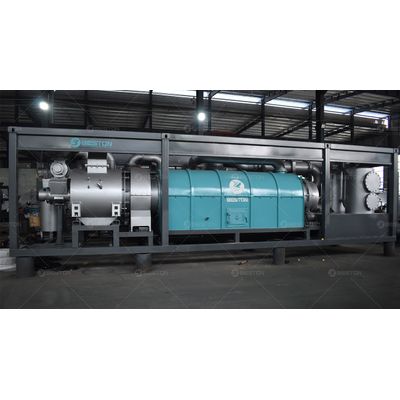

- Home
- Companies
- Beston Group Co., Ltd.
- Articles
- Food Process Waste to Biochar: Learn ...

Food Process Waste to Biochar: Learn Biochar Production Equipment
Effective management of food process waste has become a priority in sustainable waste management practices. One solution gaining attention is the conversion of food process waste into biochar, a carbon-rich product known for its environmental benefits and soil improvement capabilities.
Introduction to Biochar Production
Significance of Utilizing Food Process Waste
Food process waste poses a significant environmental concern due to its volume and potential for pollution. Transforming this waste into biochar aligns with waste reduction and sustainable resource recovery efforts.
Understanding Biochar and Its Environmental Impact
Biochar, produced through pyrolysis, is a product rich in carbon derived from biomass. It holds potential for carbon sequestration, soil enhancement, and waste reduction. Utilizing food process waste for biochar aligns with sustainable waste management practices.
The Biochar Production Process
Basics of Biochar Production
The production of biochar involves pyrolysis, a thermal decomposition process without oxygen. Through high-temperature treatment, organic materials transform into biochar.
Role of Food Process Waste in Biochar Production
Food process waste, encompassing agricultural residues and byproducts, offers organic material suitable for biochar production equipment. These materials have the potential to be transformed into a valuable resource through biochar production.
Biochar Production Equipment Overview
Pyrolysis Reactors and Technology
Various pyrolysis reactors, such as rotary kilns, batch or continuous pyrolysis units, and gasification systems, are used in biochar production. Each technology offers unique advantages and applications.
Types of Biochar Production Equipment
Equipment used in biochar production varies from small-scale batch systems to large-scale continuous pyrolysis plants. These include feedstock preparation units, reactors, and post-processing equipment for biochar refinement.
Key Factors in Efficient Biochar Production
Temperature Control and Heating Methods
Temperature control is critical in the pyrolysis process. Different heating methods, whether direct or indirect, significantly impact the efficiency of the pyrolysis process and the quality of biochar produced.
Feedstock Preparation and Quality
The quality and preparation of feedstock play a pivotal role in biochar production. Well-prepared feedstock ensures higher biochar quality and yield. Factors such as moisture content, particle size, and composition are critical considerations.
Biochar Production Equipment Selection
Considerations for Small-Scale Operations
Compact and efficient biochar production equipment is essential for small-scale operations. Batch pyrolysis systems or smaller continuous units are often preferred for their cost-effectiveness and manageable scale.
Scaling Up for Large-Scale Biochar Production
Large-scale biochar production requires robust continuous pyrolysis units capable of handling significant feedstock volumes. Scalability, efficiency, and process automation become critical in large-scale settings.
Environmental and Economic Impact of Biochar Production
Environmental Benefits and Waste Reduction
Biochar production significantly reduces food process waste, thereby minimizing environmental pollution. Additionally, applying biochar to soil contributes to enhanced soil health and carbon sequestration.
Economic Viability and Resource Recovery
Efficient biochar production equipment not only offers environmental benefits but also provides economic value. The sale of biochar and the utilization of byproducts contribute to resource recovery and revenue generation. If a small footprint option is required, a mobile biochar machine is suitable.
Conclusion and Future Prospects
The Growing Importance of Biochar Production
Biochar production is gaining prominence as a waste management and resource recovery solution, aligned with growing environmental sustainability goals. Its significance is likely to continue increasing in the future.
Potential Developments in Biochar Equipment Technology
The future of biochar production equipment may involve advancements in more efficient pyrolysis methods, innovative reactor designs, and increased automation. These advancements could enhance production capacity and sustainability.
